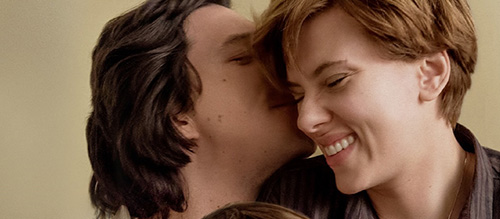Marriage Story (2019) Review
Marriage Story (2019)
Director: Noah Baumbach
Screenwriter: Noah Baumbach
Starring: Scarlett Johansson, Adam Driver, Laura Dern, Ray Liotta, Julie Hagerty, Merritt Wever, Alan Alda
Noah Baumbach gets people, warts and all. The latest in a long line of films with a “…Story” title explores the highs of love and marriage as well as the lows of falling out of love and divorce proceedings, all in a nuanced and sensitive fashion.
Nicole (Scarlett Johansson) and Charlie (Adam Driver) Barber were very much in love – married with a son, comfortable and artistically fulfilled working in theatre. Then, something changed, or rather it came to the surface and became impossible to ignore anymore so they decided to separate. This is their story.
We open with Nicole and Charlie reading a list of things they love about each other, the opposites that attracted them in the first place. This simplest of devices has us start out equally sympathetic towards both parties, seeing them at their best as a means of contrasting everything to come – they both have a long way to fall. This is the first stage of their separation, arranged by a mediator: “As we mediate your separation and eventual divorce, things can get contentious… As you come apart, you’re reminded this was someone you had great feelings for”.
When you become part of someone else’s life and vice versa, disentangling your relationship, even working out how to think about the former love of your life, becomes an impossibility. To Nicole, Charlie becomes “My almost-ex-husband, kind of like the opposite of a fiancé”. Of course Nicole never quite felt like her own person, never an equal part in the relationship, hence her main need to separate: “I became smaller… I never really came alive myself, I was just feeding his aliveness”.
Baumbach is mostly concerned with retaining emotional truth, but isn’t above poking fun at pretentious aspirations in his own industry, like Nicole’s memory of “doing this space movie, but one of those where they take space seriously, like sex trafficking in space…”. It’s one of Baumbach’s best scripts in a long of them – witty, emotive and naturalistic.
It’s a story that features theatre, is presented in spaces that are filmed theatrically and would work really well if it was performed on stage. It’s beautifully mounted, camera angles chosen carefully to heighten emotional tension and maintain the rhythm of long scenes organically. The plot gets moving in earnest when Nicole invites her sister Cassie (Merritt Wever) around to officially serve Charlie with divorce papers, and it’s the layout of their house, and what each family member is doing and where, that helps builds the tension of the deception. The drawn-out argument towards the end of the film that will doubtless be the centrepiece of Driver and Johansson ‘s “For your Consideration” montages has Baumbach place the camera unobtrusively far back in a mostly empty living room and let the scene play out, allowing the fraught emotional outbursts to speak for themselves.
The minefield and the money tap of US family law and divorce proceedings is laid as bare as the Barbers’ souls. Divorce proceedings become “a street fight” – dehumanising, bloody and brutal. To counter Nicole’s take-no-prisoners divorce attorney Nora Fanshaw (Laura Dern) Charlie is forced to upgrade from the experienced but shabby Bert Spitz (Alan Alda) to slick loudmouth Jay Marotta (Ray Liotta). To audiences outside the US, or anyone not versed in TV legal dramas, this portion of the story – an arms race of undermining and dirty tactics might seem OTT, but divorce law is a big, unforgiving business and it is accurately reflected on screen.
The Barbers are perfectly civil when out of the courtroom or their lawyers’ offices – the little things still work, but it’s the big things that have eroded their world, that they’ll never be able to get past. These are the scenes, where Nicole and Charlie end up having the same old arguments but without the filter they’ve maintained for the other’s sake (rightly or wrongly), that stay with you. The courtroom drama, and the pair’s relatively privileged lives as working artists, is more diverting than truly compelling, but as soon as they’re a fractured family in a room trying to work things out, it becomes magic.
Johansson and Driver are at the height of their powers, clearly yearning to flex their dramatic muscles after years of genre fare. They run the full gamut of difficult human experience and under Baumbach’s assured direction you never detect a false note.
A Randy Newman score can still tug on the heartstrings, but the film offers another unexpected bittersweet musical pleasure towards its end. Both Nicole and Charlie each get an unexpected, tonally and emotionally contrasting musical number to sum up where they find themselves after a trying time of change (very different, but both from the Sondheim relationships musical “Company”).
Marriage Story is a human experience that will stay with you. With no easy answers offered and no last-minute Happily Ever After, it presents people, especially those who romantically decide to commit to spending their lives with someone else, as the complex and contradictory creatures we truly are.
21/24


